

2022-09-08 12:00:00 AM | 1418 ![]() Print
Print ![]() PDF
PDF
If you are a Linkedin social media fan, then you know by now that promoting on the Linkedin platform involves spending on the high side, in fact, the cost of advertising on Linkedin is x2 if not x3 that of Facebook and Instagram Ads combined. Furthermore boosting a Linkedin post can only be executed if you run a Linkedin Business Page, with which you can create sponsor ads, due to its high end priced average cost per CPC (cost per click) and the average cost per impression CPM (cost per impression) rates both having to spend $3 CPC to $21 CPM respectively, most SMEs usually the small and start-up businesses don't see the social media platform as a go-to place for running advertisements.
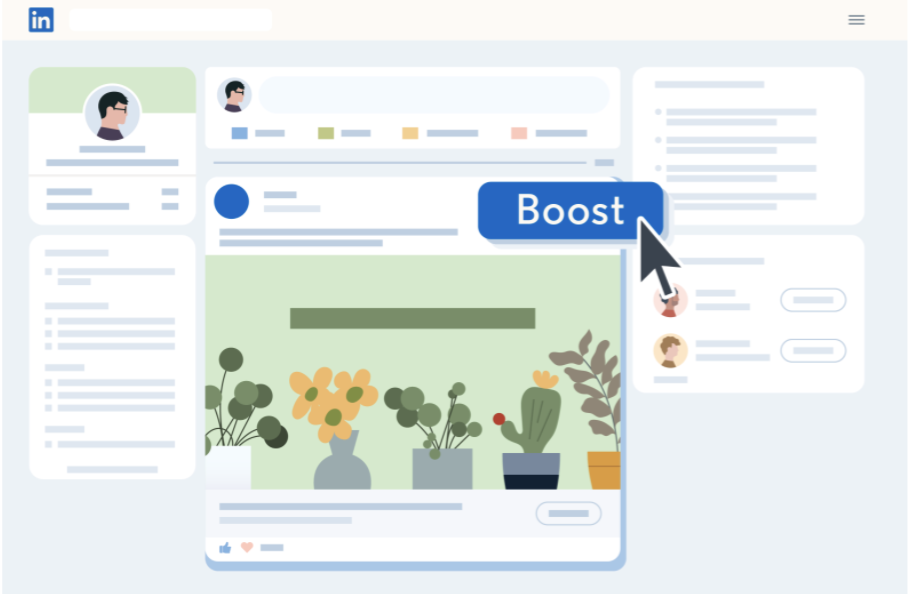
But today I will like to explain how you can actually create Linkedin Sponsor Ads with your Business page using a fraction of what you would have spent via the LInked Campaign Ads Manager, you can simply do this via boosting a post on that Business page.
You will notice the similarities with functions on Linkedin and Facebook as they are not microblogging platforms like Twitter or video-sharing platforms like Instagram or TikTok.
1.) You need to create the post itself and in creating a post I will like to share an insight with what I have discovered, that is using the Facebook business page as a reference, I was able to generate organic reach and referral traffic to my content without boosting. If you read How To Use a Facebook Page For Business Effectively it explains the tactics employed in getting maximum clicks (URL) on your boosted post to your landing page.
First, you visit your Linkedin Business page to check for the post you will like to sponsor, by default you should find the boost button at the top of each of your posts on your Linkedin business page, click on it.
2.) You will be redirected to an ad campaign manager page, where you need to set up your ads account campaign name and campaign objectives, it is also on this page you add your payment details.
To add, edit, or view billing information:
If you need to switch accounts, click the account name in the upper-left corner of the page and select the correct account name from the dropdown.
Click Account Settings on the left menu, then click Billing Center.
Click Manage credit card next to your payment method on the Billing Center page.
Click Edit and enter your new billing information.
Click Change.
3.) You need to set up your Location, Preference, and Audience in doing so you will notice when you adjust your target audience for your Linkedin Sponsor Ads campaign, that there is an estimate of total spend, clicks, and target audience size, you need to pay attention to this metrics even though they are estimates, they can help give an insight to what to expect regarding your advert performance, the more job functions and the role you add, the more audience size you will get and total spend will increase with respect to clicks.
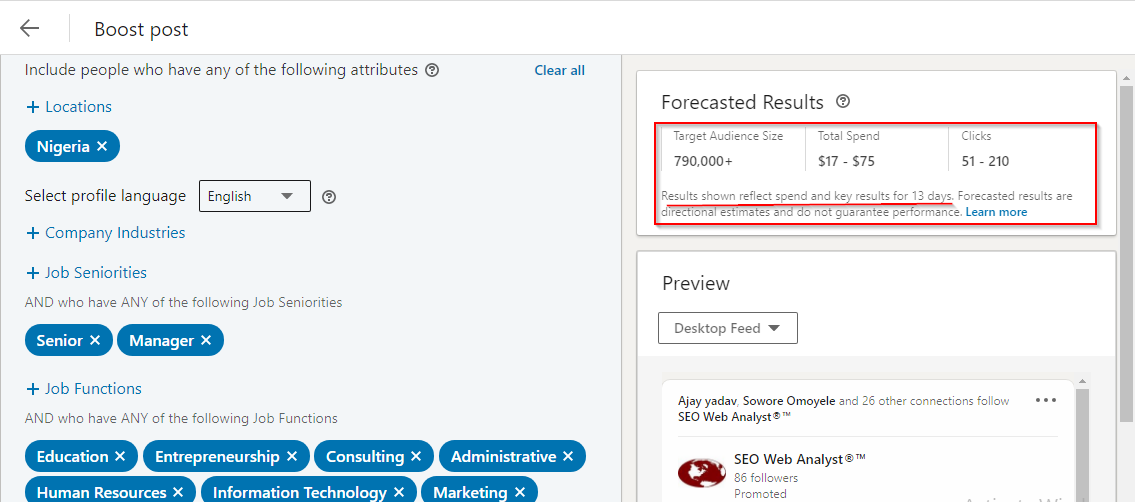
Another area you will want to focus on is the budget and schedule on your campaign manager page, because there is a budget limit or threshold you need to set up in your campaign notwithstanding the estimated budget you have been provided which is normally lower than the threshold budget required by Linkedin Ads.
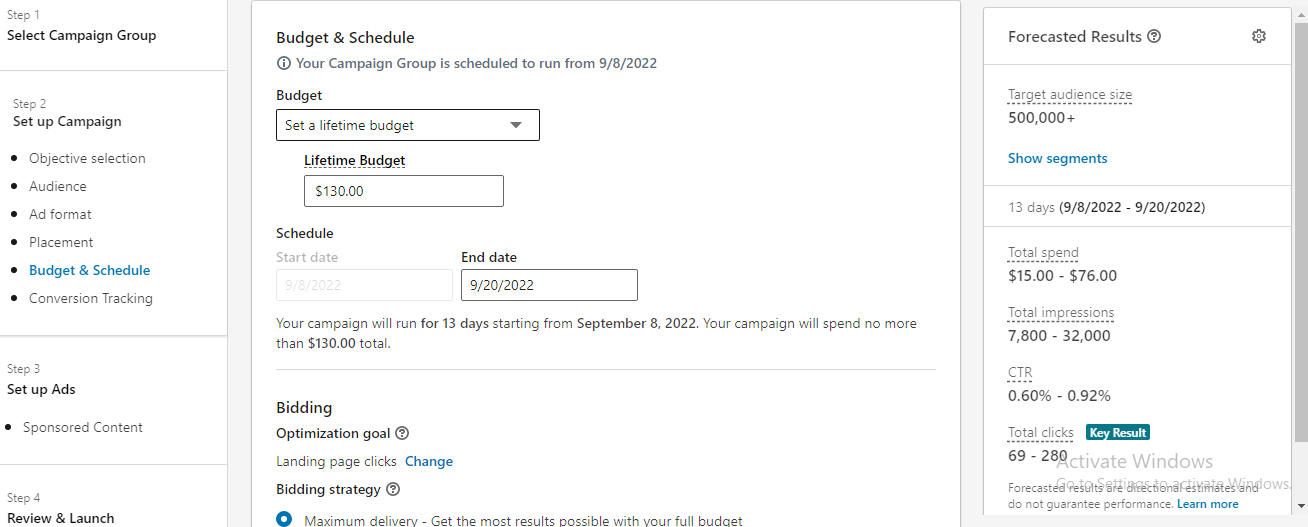
The reason for this is that we choose to use maximum delivery to get the most results possible with our full budget and we place the duration of the ad to range within an acceptable budget of ours (real-world budget of $130), if we extend the duration of the Sponsor ad then we have to increase our threshold budget, hence we are only seeking a 10% conversion rate from the Total clicks ie 6 to 28 target lead submission on the website landing page.
The expected CTR from Linkedin Campaign Ads is quite easy to speculate that executing Ads on the platform is very expensive compared to placing Ads on Google or its social media counterpart, Facebook. The only merit with Linkedin is the fact that it is geared toward business-oriented professional leads who might actually find your campaign more relevant to them if you are pushing productive, informative, or beneficial ads eg service ads, intangible product ads, and educational ads with the exception of consumable or fashionable, trend ads eg consumable product ads, e-commerce ads, music ads, news ads, etc they do not do well on the Linkedin platform.
4.) Next step is to create your conversion tracking for your campaign, similar to Facebook page pixel. In this case, you need to create a measurable trigger for your campaign to set up conversion tracking. To do so you will be given your Campaign insight tag.
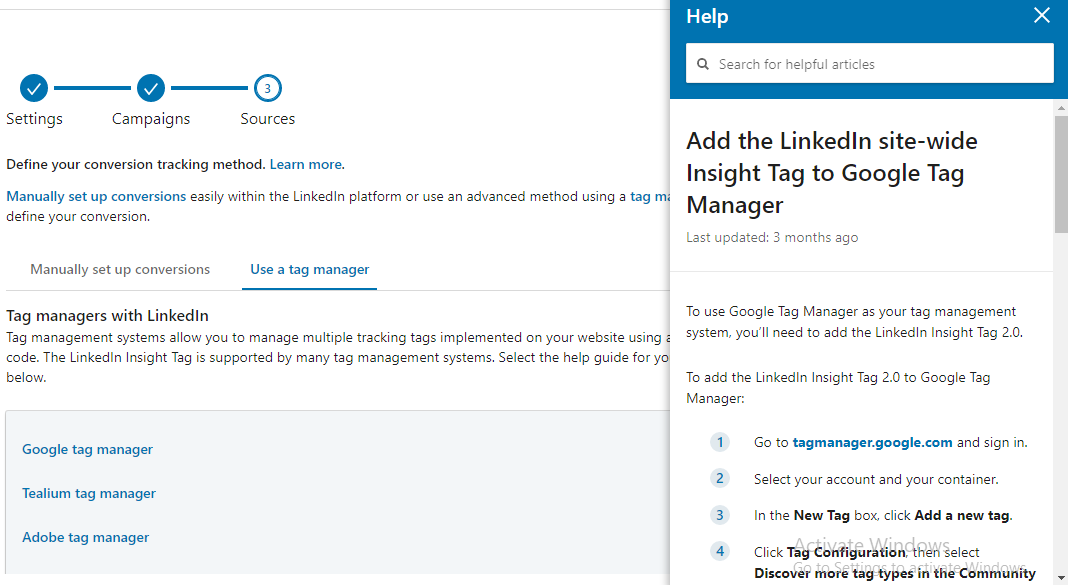
To do this you will be offered two basic options, to either do this manually or do this via Google Tag manager, as you can see above I choose to use Google tag manager, which is the best way to load all my containers of Tags (Pinterest, Twitter, Schema, Facebook, Google Adwords, Analytics, etc) of various codes using a single line of code.
You simply follow the Help guide pop-up window from the right side of the screen as instructed and get your tag created, to complete the new tag, you need the Linkedin Insight Tag for your campaign conversion.
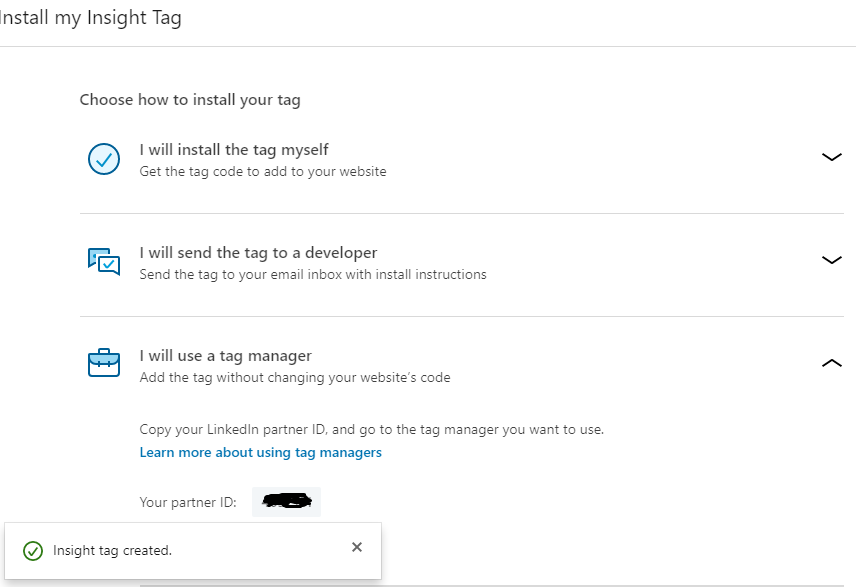
You can check how to locate your Campaign Insight Tag after you have found it, simply place the tag number into your new tag creation, and for trigger select page view and save then publish.
On your LinkedIn page above you will be given a Linkedin Partner ID and a code this code represents the conversion Id
<!-- start Linkedin Conversion Tag Manager -->
<script>
window.lintrk('track', { conversion_id: 10241441 });
</script>
If you are doing this manually you will be given the full code to implement like the example in the image below;
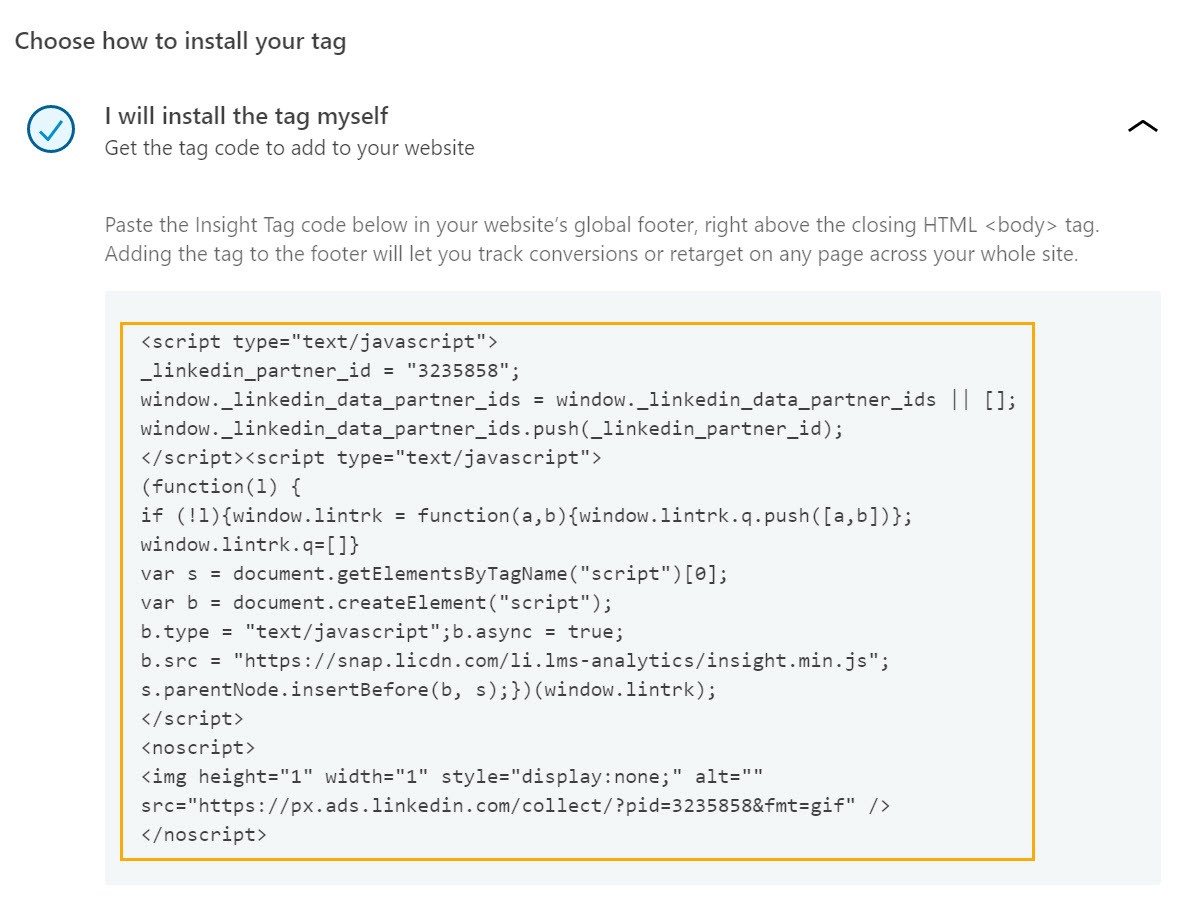
5.) After you have successfully created your conversion tracking page, you need to link it to your campaign from your campaign manager page (you will be redirected to the page when done with the conversion tracking setup). With everything in order, you should continue to the final stage of reviewing your Linkedin Business Page Sponsor Boost ad and publish the campaign.
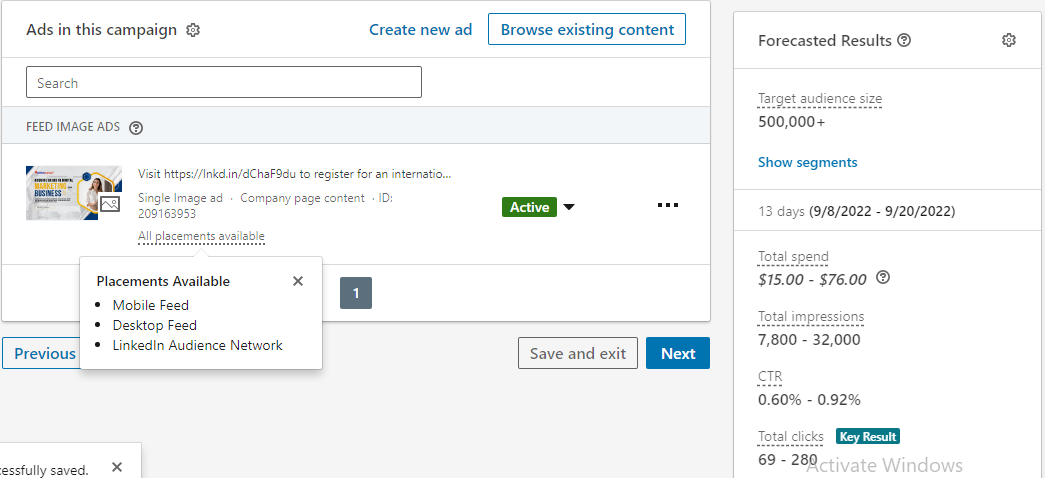
To conclude on how to boost Linkedin posts via Sponsor ad, I will recommend the use of not adding any Advert creative like image or video, it is best for the post to pull the image from the social card or open graph of your page, that is the social media metadata present on your page since by default Linkedin pulls the open graph image content of the page itself. That way you will also increase the clicks you get from your sponsored post to your website (campaign objectives).
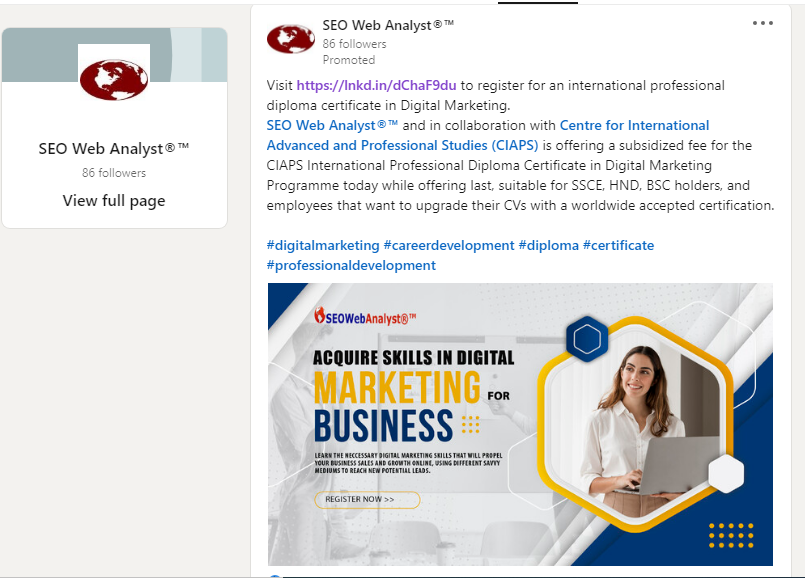
A final result of what the Linkedin Sponsored Boost Post for a page looks like.
Another thing I notice is that you cannot edit the ad creative of a campaign ie you cannot change the image format from a single image to a carousel or video, which may be due to it being a boosted post ad.
So, I will recommend you make sure your objective is concise with your tactics of achieving an optimum goal, remember most of these advertising platforms are more into their profits, so you need to optimize your ads as well with organic means of reaching maximum performance.
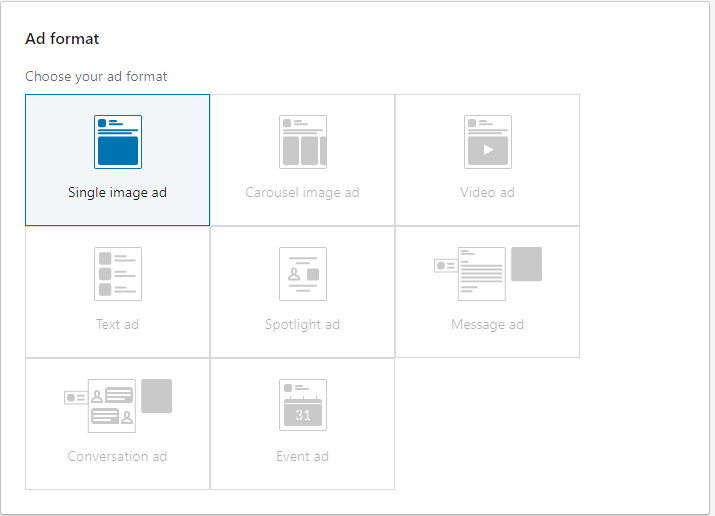

I am a seo web analyst and have a love for anything online marketing. Have been able to perform researches using the built up internet marketing tool; seo web analyst as a case study and will be using the web marketing tool (platform).
How To Fix Cloudflare Error 522 Connection Timed Out
How To Optimize Cache Performance via HTACCESS Apache Server
How To Fix GA4 Showing Wrong Domain Traffic
How To Reactivate Google Adsense Account
How Do You Write Pitch Deck That Wins Investors
Effective Lead Magnet Funnel Examples For Businesses
How To Promote FMCG Products Using Digital Marketing
The Main Objectives Of SEO in Digital Marketing
How Artificial Intelligence Is Transforming Digital Marketing
Google CEO Sundar Pichai: Search will profoundly change in 2025